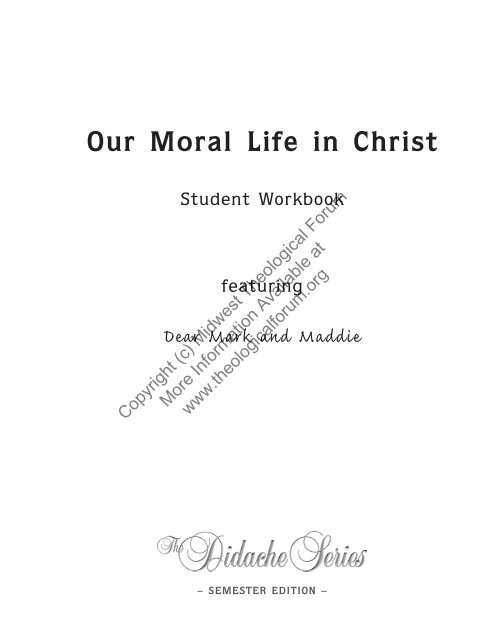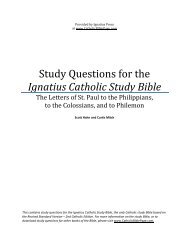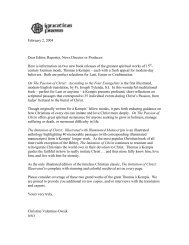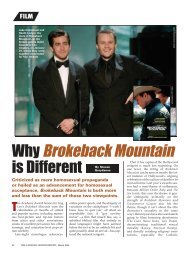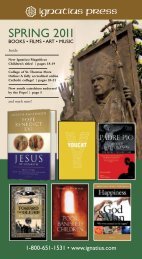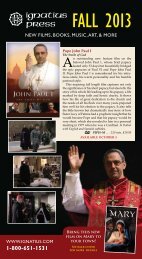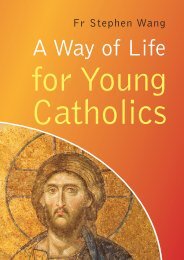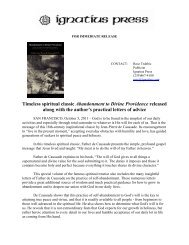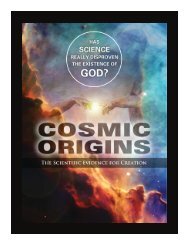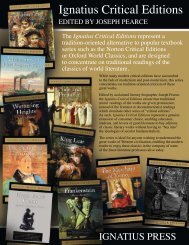to view sample pages
to view sample pages
to view sample pages
Create successful ePaper yourself
Turn your PDF publications into a flip-book with our unique Google optimized e-Paper software.
Our Moral Life in ChristStudent WorkbookfeaturingDear Mark and MaddieCopyright (c) Midwest Theological ForumMore Information Available atwww.theologicalforum.org– SEMESTER EDITION –OMLS-WB.indb 18/21/2009 8:06:29 AM
ContentsAbbreviations Used for the Books of the BibleviChapter 1: The Basis for Morality and Moral Theology 1Chapter 2: Freedom and Conscience 21Chapter 3: Morality in Law and Action 37Chapter 4: Sin and the Commandments 51Chapter 5: The First Three Commandments 65Chapter 6: The Fourth Commandment 85Chapter 7: The Fifth Commandment 93Chapter 8: The Sixth and Ninth Commandment 103Chapter 9: The Seventh, Eighth, and Tenth Commandment 115Chapter 10: Epilogue: Living the Christian Life 131Catholic Prayers and Devotions 133Copyright (c) Midwest Theological ForumMore Information Available atwww.theologicalforum.orgvOMLS-WB.indb 58/21/2009 8:06:29 AM
textbookp. 1Chapter 1The basis for moral theologyDear Mark and Maddie —I al w a ys thou ght o f mys e l f a s a good Catholic. I mean, like my family and I alwa ys go <strong>to</strong>Mass on Sun day, and we c e le b ra te things like C h r i s t m a s and Ea s te r at ho m e. I’m no t sayi n gI’m p erfe ct o r anything, b ut w he n I’m with my boyfriend and out with my friends, I s taya w ay fro m mo s t o f what some o f the o ther p eop le in my class are do ing . . . you k now w hat Imean. Bu t late ly I have b ee n wonderin g w hy. My b r o t h e r went away <strong>to</strong> co llege la s t year, andhe sa y s that w e need <strong>to</strong> b e more op en‐minded. He says that no b ody really k nows the truth. Helearne d that right and wrong depend on the fee l i ngs and exp e rie nce o f the indi v idual, andthat re ligion makes p e o p l e p u p p e t s i n s tead o f i n de p e ndent th i nke rs. At least that’s w hat they<strong>to</strong> ld him in college. What i f he’s ri ght? How do I k no w all this Chr i s tianity stu ff i s true?Sure, I have seen a lo t o f my friends ge t in<strong>to</strong> a lo t o f trou b le with alco ho l and sex. Many o fthem spend mo s t o f the l i ttle time they are at home arguing with their parents. I guess it’sno wonder they want <strong>to</strong> escape <strong>to</strong> the p arties all the time. I want <strong>to</strong> do the right thing, b ut itseems I’m m i s s i n g out on a lo t o f fun, <strong>to</strong>o. How do I k now w hat is true?After reading the chapter, write a response <strong>to</strong> this letter:Dear Wondering and Wandering:— A Wonderin g and Wanderin g Se niorCopyright (c) Midwest Theological ForumMore Information Available atwww.theologicalforum.orgChapter One 1OMLS-WB.indb 18/21/2009 8:06:31 AM
OUR MORAL LIFE IN CHRISTIntroduction1. We can use the analogy of a sports team when it comes <strong>to</strong> our Catholic Faith. If we want <strong>to</strong> live amoral life in Christ, we need <strong>to</strong> study our “playbook.” In terms of our Catholic Faith, that meansthe Bible and the Catechism. The foundation for our Christian morality can be found in the TenCommandments and the Beatitudes.Write the Ten Commandments and the Beatitudes in the space provided. If you have forgottenthem, you will find the Ten Commandments in Exodus 20: 1– 17 and Deuteronomy 5: 6– 21. Theversions of the Ten Commandments from Exodus and Deuteronomy, along with the TraditionalCatechetical Form, may be found in the back of this book or in the Catechism of the CatholicChurch immediately preceding no. 2052. The Beatitudes may be found in the back of this book, inthe Gospel of St. Matthew 5: 3– 12, and in the Catechism of the Catholic Church, no. 1716.The Ten Commandments:1.2.3.4.5.6.7.8.9.10.The Beatitudes:•••••••••Copyright (c) Midwest Theological ForumMore Information Available atwww.theologicalforum.org2 Chapter OneOMLS-WB.indb 28/21/2009 8:06:31 AM
THE BASIS FOR MORALITY AND MORAL THEOLOGY2. Distinguish between objective morality and subjective morality.3. What is moral relativism?4. Recall an example of when you have seen people being guided by moral relativism or subjectivemorality. Explain it.What the moral law is not5. Morality governs many human actions and choices, but the word “morality” is often associated withlaws governing sexual activity and human reproduction. What are some other areas and examplesof human activity where objective morality applies?Copyright (c) Midwest Theological ForumMore Information Available atwww.theologicalforum.org6. We are <strong>to</strong>ld that morality is not just a list of precepts and “thou shalt nots.” Look again at the TenCommandments. Seven of these commandments begin with “You shall not.” Can you rewrite thesecommandments as positive statements beginning with “You shall”?Chapter One 3OMLS-WB.indb 38/21/2009 8:06:31 AM
OUR MORAL LIFE IN CHRIST7. The claim that Christian morality (especially as described by Catholic teaching) is not about a lot ofrules would raise objections from many who see the Church in this light. How would you explain thereality?Characteristics of the moral law8. Below are some cases where the cardinal virtues might be applied. Write the name of the cardinalvirtue that would be called upon <strong>to</strong> resolve each case, and then write a brief explanation beneatheach as <strong>to</strong> why you think the virtue you wrote applies <strong>to</strong> the situation.Mike loves <strong>to</strong> play video games. The interactive games on the Internet areespecially attractive <strong>to</strong> him. He can sit at the computer for hours, sometimeseven losing an entire night’s sleep playing games, and, once in a while, helooks at pornographic Web sites.Melissa has had ambitious career plans ever since she started high school.She demands a lot out of herself and pushes herself hard. Recently hersister’s baby died. During and after the funeral, Melissa has been questioningher values and the real meaning of her life.Jorge and Carissa have been dating for a few months now. Jorge has beengetting more assertive in the physical dimension of the relationship, andCarissa has been equally receptive <strong>to</strong> Jorge’s advances. They have bothtalked about “not wanting <strong>to</strong> go <strong>to</strong>o far,” but once they get <strong>to</strong>gether, neitherseems <strong>to</strong> be able <strong>to</strong> control himself or herself.Copyright (c) Midwest Theological ForumMore Information Available atwww.theologicalforum.orgKevin owns a T‐shirt printing business. Oftentimes he finds himself having <strong>to</strong>cut his own pay <strong>to</strong> make sure his workers are paid their full wages on time.4 Chapter OneOMLS-WB.indb 48/21/2009 8:06:31 AM
THE BASIS FOR MORALITY AND MORAL THEOLOGY9. The theological virtues of faith, hope, and charity (or love) are mentioned in relation <strong>to</strong> the cardinalvirtues. The theological virtues originate in the New Testament (cf. 1 Cor 13: 13 and 1 Thes 1: 3).The Catechism of the Catholic Church tells us that these virtues “are the foundation of Christianmoral activity; they animate it and give it its special character. They inform and give life <strong>to</strong> all moralvirtues. They are infused by God in<strong>to</strong> the souls of the faithful <strong>to</strong> make them capable of acting as hischildren and of meriting eternal life” (CCC 1813).How would the theological virtue of faith inform and give life <strong>to</strong> the cardinal virtue of fortitude inthe case of Jorge and Carissa (cf. Question 8)?How would the theological virtue of hope inform and give life <strong>to</strong> the cardinal virtue of prudence inthe case of Melissa (cf. Question 8)?How would the theological virtue of charity (or love) inform and give life <strong>to</strong> the cardinal virtue ofjustice in the case of Kevin and his T‐shirt business (cf. Question 8)?Copyright (c) Midwest Theological ForumMore Information Available atwww.theologicalforum.org10. A bishop was visiting a class of candidates for Confirmation. In his discussion with the group, heasked them: “How do we know what is good and what is evil? What is it that makes something goodor evil?” According <strong>to</strong> the text, what is the answer <strong>to</strong> this question?Chapter One 5OMLS-WB.indb 58/21/2009 8:06:31 AM
OUR MORAL LIFE IN CHRISTMoral law and free will11. What is the cause of the flawed nature that we inherit from Adam and Eve?12. Read the following excerpt from St. Paul’s letter <strong>to</strong> the Romans: “We know that the law is spiritual,but I am carnal, sold under sin. I do not understand my own actions. For I do not do what I want,but I do the very thing I hate. Now if I do what I do not want, I agree that the law is good. So then,it is no longer I that do it, but sin which dwells within me. For I know that nothing good dwellswithin me, that is, in my flesh. I can will what is right, but I cannot do it. For I do not do the goodI want, but the evil I do not want is what I do. Now if I do what I do not want, it is no longer I thatdo it, but sin which dwells within me. So I find it <strong>to</strong> be a law that when I want <strong>to</strong> do right, evil liesclose at hand. For I delight in the law of God, in my inmost self, but I see in my members anotherlaw at war with the law of my mind, and making me captive <strong>to</strong> the law of sin which dwells in mymembers. Wreched man that I am! Who will deliver me from this body of death? Thanks be <strong>to</strong> Godthrough Jesus Christ our Lord! So then, I of myself serve the law of God with my mind, but withmy flesh, I serve the law of sin” (Rom 7: 14– 25).St. Paul is one of the architects of Christianity. Does he claim <strong>to</strong> have mastered sin in his own life?How does he describe his own moral struggles?Do these moral struggles take away from St. Paul’s moral authority or enhance it? That is, given thisself‐confessed state of St. Paul’s own life, does he have any business telling other people how <strong>to</strong> livetheirs?Copyright (c) Midwest Theological ForumMore Information Available atwww.theologicalforum.orgHow does St. Paul resolve this interior conflict? (Hint: Re<strong>view</strong> Rom 7: 24– 25; 1 Cor 15: 10)6 Chapter OneOMLS-WB.indb 68/21/2009 8:06:31 AM
Moral law and grace13. When do we receive sanctifying grace?THE BASIS FOR MORALITY AND MORAL THEOLOGY14. When do we receive actual grace?15. While we need grace <strong>to</strong> conform ourselves <strong>to</strong> God’s will, there are certain aspects of obeying Godthat come more naturally than others. What would some of these be?16. Many <strong>to</strong>day have a tendency <strong>to</strong> excuse their sins and imperfections by saying, “Hey, I’m only human,”“Nobody’s perfect,” or, “I’m just doing the things any normal sixteen‐year‐old does.” Of course,we are human. Humans are not perfect, and every human must struggle with temptation, but is itinevitable that we are going <strong>to</strong> keep sinning, or is it possible for us <strong>to</strong> avoid all sin?Copyright (c) Midwest Theological ForumMore Information Available atwww.theologicalforum.orgMoral law and the Christian vocation17. Re<strong>view</strong> the letter from “Wondering and Wandering Senior,” and answer the following questions:Has this young lady been called by God? How?Chapter One 7OMLS-WB.indb 78/21/2009 8:06:31 AM
OUR MORAL LIFE IN CHRISTHow has she already responded <strong>to</strong> God? What more does she need <strong>to</strong> do?Christian morality consists in striving <strong>to</strong> live as Christ did. How is she doing so, and what moreshould she be striving for?18. Which of the following individuals is the holiest: A married woman, an elderly widower, a teenagegirl, a nun, or a Catholic priest? Why?19. Which of the individuals in the previous question is called <strong>to</strong> a higher level of holiness?Vocation and discipleshipCopyright (c) Midwest Theological ForumMore Information Available atwww.theologicalforum.org20. Read how the book defines “discipleship.” How does one become a disciple of Christ?8 Chapter OneOMLS-WB.indb 88/21/2009 8:06:31 AM


